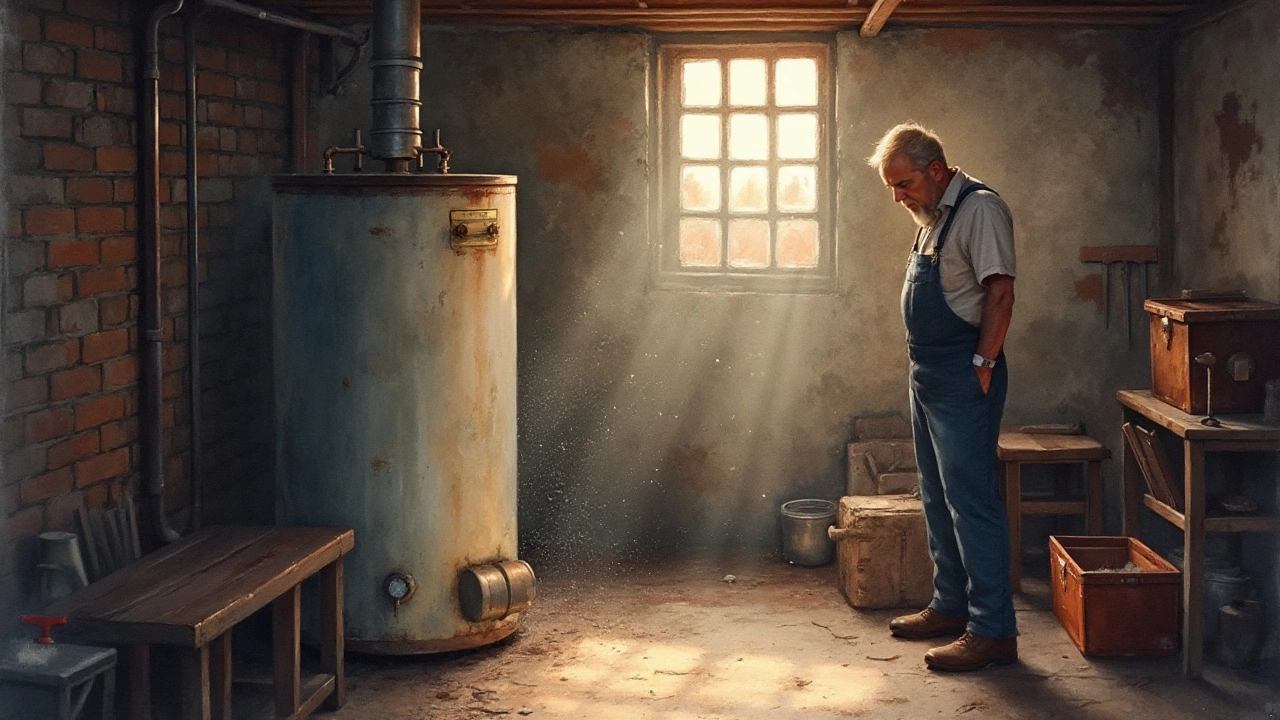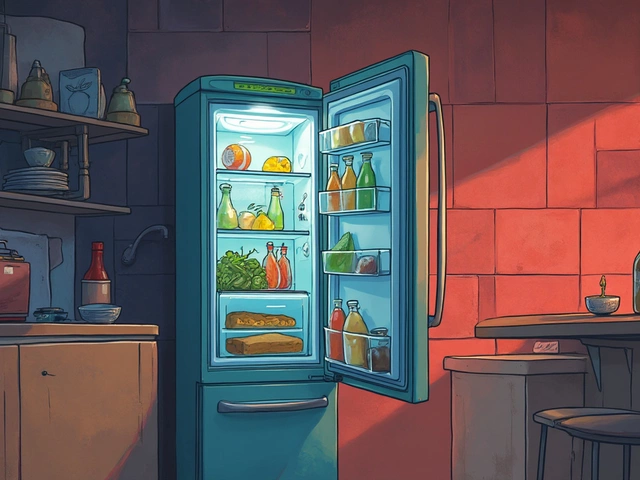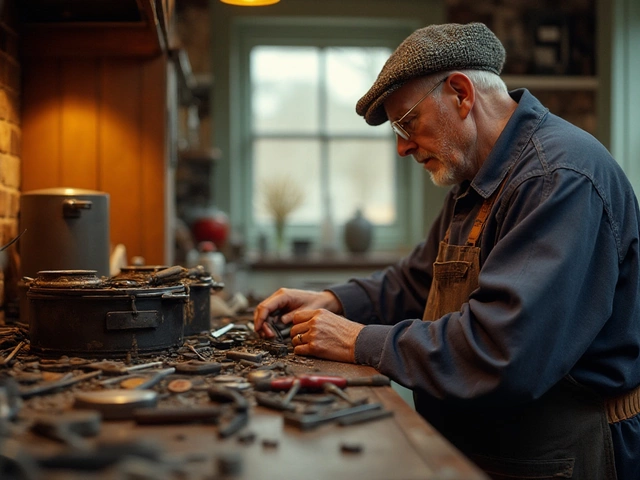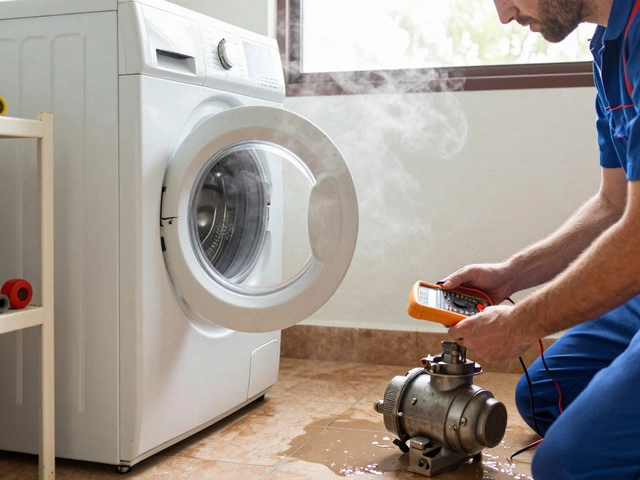When facing the dilemma of whether to repair a 20-year-old water heater, homeowners often find themselves weighed down by questions of cost, efficiency, and practicality. As water heaters age, their efficiency typically diminishes, potentially leading to higher energy bills and frequent breakdowns that could disrupt your daily routine. It's essential to understand the lifespan of these appliances to make a well-informed choice.
In this article, we'll delve into key indicators that signal when your water heater might need attention, such as unusual noises, inconsistent water temperatures, or visible leaks. We'll weigh the financial aspect by exploring the costs associated with repairs versus the investment in a new unit. Additionally, there are energy efficiency benefits that come hand-in-hand with modern water heaters, a factor worth considering in your decision.
Whether you opt for repair or replacement, knowing the state of your water heater and understanding contemporary options will guide you in ensuring long-term comfort and savings. Arm yourself with expert tips and make a decision that best fits your household needs.
- Understanding Water Heater Lifespan
- Signs Your Water Heater Needs Attention
- Cost-Benefit Analysis of Repairs
- Energy Efficiency Considerations
- Alternative Options and Upgrades
- Expert Tips for Decision-Making
Understanding Water Heater Lifespan
When considering the longevity of your water heater, several factors come into play that influence how long these appliances can effectively serve your household. Most conventional water heaters, whether gas or electric, are designed to last between 8 to 12 years, with proper maintenance being a crucial factor in extending their lifespan. The lifespan can vary based on usage, water quality, and even the climate in which your home is located. Hard water, for example, known for its high mineral content, can significantly reduce the lifespan of a water heater due to limescale buildup.
A critical aspect to understand is that as water heaters age, their efficiency tends to decline. This decline is due to sediment buildup at the bottom of the tank, which can act as an insulator, making it harder for the water heater to warm the water. Additionally, older units often lack the advanced energy-efficient technologies found in modern models, potentially leading to increased energy consumption and higher utility bills. It’s not uncommon for homeowners to overlook these subtle signs of aging, focusing more on performance issues that might require immediate attention.
Manufacturers typically provide a warranty that often mirrors the expected lifespan of the water heater. A 6-year warranty, for instance, might indicate the manufacturer's confidence in the unit's reliability for at least that period. However, many heaters outlast their warranties thanks to regular upkeep. Routine maintenance such as flushing the tank, checking the anode rod, and inspecting for leaks are simple practices that can help prolong its use. Recognizing the nuances of your water heater's functional life aids in planning replacements proactively rather than reacting to emergencies.
"Regular maintenance is the key to extending the service life of appliances. Water heaters are no exception, and a little attention can save homeowners a lot of hassle," notes home improvement expert Bob Vila.
Another factor worth mentioning is how technological advancements have rendered newer heaters more durable and efficient. For instance, tankless water heaters, also known as on-demand heaters, often offer longer lifespans, sometimes exceeding 20 years with proper care, and provide superior energy efficiency compared to their tank-based counterparts. Such options might present a compelling case for replacement when your old trusty water heater starts exhibiting signs of fatigue.
To wrap up, understanding your water heater's lifespan involves assessing various elements, from the impact of your local water quality to the type of heater installed in your home. It also includes weighing the costs of repairs against the potential energy savings that newer models could provide. While age is a key indicator of when you might need a new unit, the everyday use and care it receives often hold more sway in determining its lifespan. By being proactive and informed about your water heater's lifecycle, you can make the best decisions for maintaining a warm and comfortable home environment.
Signs Your Water Heater Needs Attention
Recognizing the signs that your water heater might need repair is crucial for maintaining an efficient and cost-effective home appliance system. One of the most telling indicators is a lack of consistent hot water. If you find yourself shivering mid-shower, it might be time to consider whether the heater is meeting your needs or faltering. Older water heaters might struggle to maintain temperatures due to sediment buildup or deteriorating heating elements, both of which could cause fluctuations in water temperature.
Another notable sign is strange noises emanating from your water heater. Clanking, knocking, or popping sounds often indicate sediment buildup in the tank. As these residues solidify at the bottom, they interact with the heating elements, causing noise. Not only can this disrupt your peace, but it may also spell trouble for the efficiency of the machine. Addressing these noises early could potentially save you from a costly repair.
Leaks or puddles around the base of your appliance can signify structural issues, often stemming from corrosion, faulty valves, or a damaged tank. Even a small leak should not be ignored, as it has a potential to worsen over time and even lead to water damage in the home. Moreover, rusty or discolored water is another red flag. Metal tanks can corrode over time and might contaminate your water supply, causing it to appear yellow or brown. This is not only visually unappealing but could pose health risks.
The age of your water heater also plays a significant role. Most models are designed to last between 10 to 15 years, though some may extend up to 20 with proper maintenance. If yours has reached or exceeded this timeframe, it's prudent to be more vigilant about its performance. Regular inspections by a qualified technician can provide peace of mind. An often-overlooked symptom is increased energy bills. An aging unit might require more energy to maintain the desired water temperature, signaling a decrease in efficiency.
According to the U.S. Department of Energy, "Water heating accounts for about 18% of the energy consumed in your home." Keeping a water heater in good working condition is not only about comfort but also about managing your household expenses.
A quick checklist for homeowners includes checking the pilot light if you own a gas water heater; a frequently extinguished light can signal a need for repair. Lastly, be wary of foul odors emanating from the water. Bad smells can indicate bacteria growth within the tank, necessitating a flush or an inspection. Regular maintenance checks, such as draining a few gallons of water every six months, can help extend the life of your appliance and detect any early-stage issues.
Cost-Benefit Analysis of Repairs
Deciding whether to repair a 20-year-old water heater involves weighing the financial implications against the potential benefits. First and foremost, consider the frequency and cost of past repairs. A water heater that’s already undergone multiple fixes may signal that it's reaching the end of its serviceable life. Typically, a conventional water heater doesn’t last much beyond 12 to 15 years, with some exceptions making it to 20. But when your unit is two decades old, it might be time to ask some hard questions.
To accurately assess the situation, gather quotes from reputable specialists. Repair bills for an older unit can range anywhere from $150 to $500 depending on the issue, with replacements for significant components, like the thermostat or heating element, often falling on the pricier end. These costs can quickly add up, especially if your heater breaks down frequently, leaving your household without an essential amenity.
One should also factor in the efficiency aspect. Older heaters tend to consume more energy, translating to higher utility bills. According to the U.S. Department of Energy, water heating accounts for about 18% of your home’s energy use. If upgrading to a newer model, those built with advanced technology can significantly reduce your monthly electric bill. In fact, tankless water heaters that have become increasingly popular can be 24% to 34% more energy-efficient than traditional models for homes using 41 gallons or less of hot water daily.
It is crucial to look at not just the immediate cost of repair but also the potential savings a new system offers over time. Replacing a highly inefficient old model could ultimately sow peace of mind in reduced bills and improved performance. Keep note that some areas offer rebates or incentives for trading in old models for high-efficiency replacements, enhancing the financial end of the deal. A local incentive program can save you anywhere from $200 to $500, thus lowering the burden of an upfront replacement cost.
Long-Term Considerations
In the long run, opting for a brand-new replacement can offer benefits far outweighing the one-off hit of its price. One must balance the present costs against future repairs and inefficiencies. When consulting specialists, ask probing questions about the health of the unit, repair guarantees, and any foreseen issues stemming from the heater’s age. A professional can extend insightful advice on the extent of deterioration and potential inherent flaws with older models, which aren’t always visible to the untrained eye."While repairing an old water heater may seem cost-effective in the short term, replacement is often the most prudent choice," mentions James Reynolds of the Home Appliance Association. "Newer models not only deliver better efficiency but oftentimes include smart home capabilities, a feature increasingly prudent in today’s environment-conscious world," he concludes.
Ultimately, the decision to repair or replace needs to be based on the numbers. We recommend creating a small table to compare the potential cumulative costs of ongoing repairs versus a one-time replacement:
| Factor | Repair Costs | New Heater Costs |
|---|---|---|
| Initial Cost | $150-$500 per repair | $800-$1,500 |
| Efficiency | Low (Consumes more energy) | High (Saves on energy bills) |
| Incentives | None | Rebates available |
Performing such a cost-benefit analysis arms you with clear-cut options and empowers you to make a savvy financial decision that keeps your home running smoothly, efficiently, and comfortably.
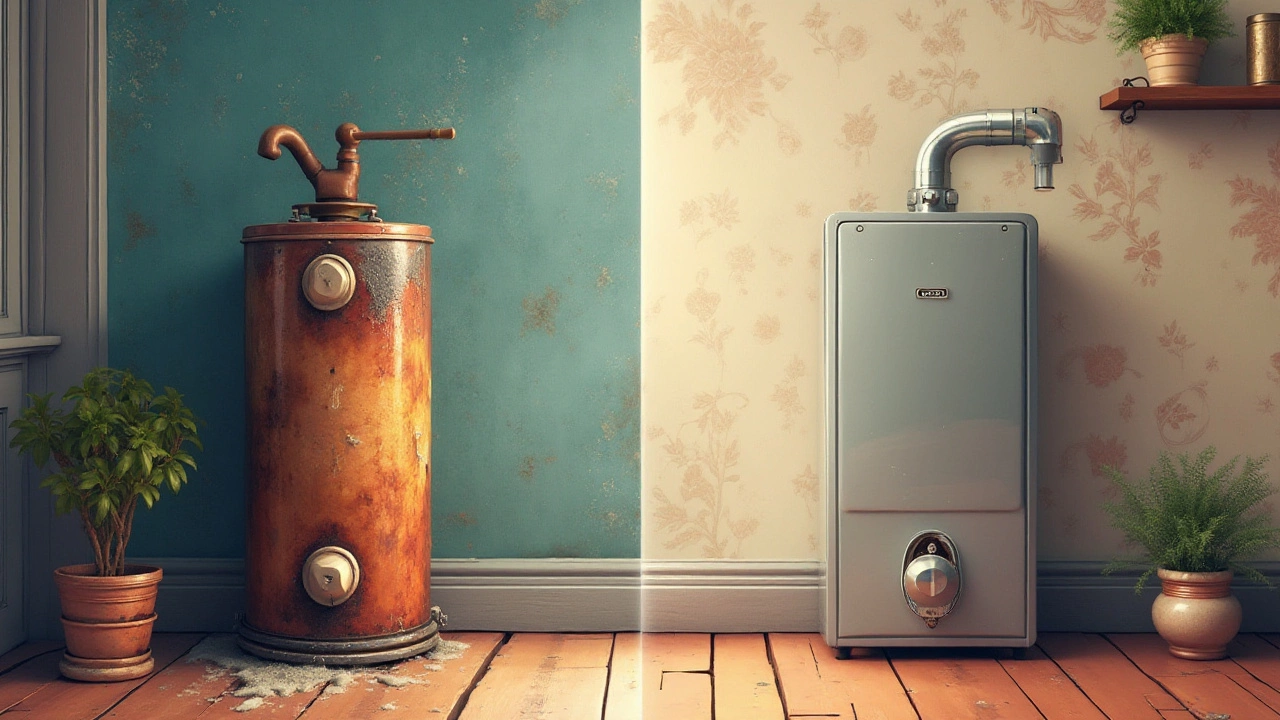
Energy Efficiency Considerations
Living with a 20-year-old water heater brings us to the matter of energy efficiency, a pivotal element in deciding whether to repair or replace this household necessity. As technology has advanced over the past two decades, so has the ability of new models to provide hot water efficiently while using remarkably less energy. Older water heaters were built on an archaic understanding of energy conservation, leaving them lagging far behind current standards. These standards not only save hard-earned money but also help mitigate the larger carbon footprint associated with outdated models.
One tangible advantage that newer models hold over their aging counterparts is the advent of improved insulation technology. The insulation surrounding the tank plays a crucial role in reducing heat loss, meaning your water heater needs to work less to keep your water hot. This translates to a bit more on your savings and a little less on your monthly energy bill. Notably, modern units have been found to heat water up to 30% faster than older ones, ensuring that a hot shower is never out of reach. By replacing an old water heater with an energy-efficient model, homeowners can expect a reduction in energy consumption between 10% to 50%, depending on usage habits.
“According to the U.S. Department of Energy, residential water heating accounts for approximately 18% of household energy use, making it the second-largest energy expense in the home.”
Now that you've considered your unit’s energy consumption, efficiency ratings become an imperative factor to think about. Water heaters today come with their Energy Factor (EF) rating clearly displayed, assisting consumers in determining each model's efficiency. The EF rating signifies how much hot water the unit can produce per unit of fuel consumed over a typical day. Naturally, a higher EF implies a more efficient appliance. By law, manufacturers are required to provide these ratings, giving you the essence of transparency, so you're not left groping in the dark when making a purchase decision.
Apart from the concentration on energy efficiency alone, another element that often gets overlooked is the potential rebates and incentives associated with upgrading to a newer model. Governments and utility companies understand the environmental toll of energy consumption, concocting incentives to persuade more homeowners to switch to efficient alternatives. By inspecting available rebates and tax incentives, the initial cost of a modern water heater could be dramatically reduced, freeing up the budget for other home improvements.
Now, let's address alternative energy solutions, like solar panels and heat pump water heaters, both representing futuristic trends in sustainability. Albeit a higher initial investment, the payoff in the long term is substantial. Solar water heaters, for instance, draw warmth from the sun, significantly lowering your dependence on nonrenewable energy sources. Heat pump water heaters use ambient heat from the air, transferring it to the water. They epitomize a commitment to preserving Earth's resources, ensuring generations to come inherit a greener, healthier planet.
Assessing the energy efficiency of your water heater is more than a cursory glance at your utility bill. It's an exploration into modern energy conservation measures and an empowering step towards living a sustainable lifestyle. As you ponder a repair or replacement, remember the impact that energy efficiency can render, not just to your wallet but to the environment at large. When it comes to water heater repair, understanding these conservation principles aids you in making a proficient choice for both today and the many tomorrows that follow.
Alternative Options and Upgrades
When grappling with the choice between repairing a 20-year-old water heater and upgrading to a new one, it's crucial to explore the array of modern alternatives that can potentially save energy and improve efficiency in your home. Today's market offers several options that can cater to different needs and budgets. The shift towards energy-efficient appliances globally has led to innovations in how we heat water in our homes, reducing both the environmental footprint and monthly utility bills.
First on the list are tankless water heaters. Unlike conventional models, these units provide hot water on demand, avoiding the standby energy loss that occurs in traditional water heaters with tanks. This means you only heat water as you need it, which can lead to significant savings, especially for households with lower hot water usage. Many consumers are drawn to the compact size of these heaters, which free up space and offer versatility in where you can install them around the house.
Heat pump water heaters, or hybrid water heaters, are another exciting alternative. These devices work by transferring heat from the surrounding air to the water, using electricity more effectively compared to conventional systems. This could slash your water heating costs by up to 60%, as stated by the Department of Energy. Such a reduction is attractive for large families or households with extensive hot water demands. However, these models do require more space and might not perform as well in colder climates, which is something to consider based on your geographical location.
For those interested in sustainable energy solutions, solar water heaters present an eco-friendly upgrade path. These harness the power of the sun to heat water, significantly cutting down on fossil fuel usage. Though they might entail a higher initial investment, the potential for tax credits and incentives, alongside reduced energy bills, make them a viable long-term investment. A report by the Solar Energy Industries Association highlights the growing trend toward solar technology adoption, driven by its environmental and financial benefits.
An interesting mid-ground solution emerging is the use of point-of-use water heaters. These compact units supply hot water directly where it's needed, such as at a specific sink or shower, eliminating extra wait time for the water to reach its desired temperature. They work well in conjunction with an existing water heater system, relieving the main heater of some demand and increasing household efficiency. In situations where the primary water heater is being repaired, deploying these units can be beneficial for ensuring continuous hot water access.
John Smith, a renowned energy expert, once said, "In the quest for sustainability, upgrading home appliances is not merely about luxury but a responsible choice for future generations."
Understanding these options in detail, along with assessing the pros and cons of each against your specific circumstances, can help solidify a decision. Whether it's cutting costs, conserving energy, or seeking a green alternative, today's market is rife with choices that extend beyond simply fixing outdated water heaters. Carefully weighing these considerations can lead to a decision that provides comfort, efficiency, and sustainability in the long run.
Expert Tips for Decision-Making
Deciding whether to repair or replace your aging water heater is not a decision to be taken lightly. There are several factors at play that can impact your choice and understanding these can guide you toward a more informed decision. It's crucial first to assess the 20-year-old water heater's condition. Look for visible signs such as rust-colored water, which could indicate corrosion inside the tank, or any strange noises like rumbling or popping, often a result of sediment build-up. If any of these are present, a professional assessment might be necessary to prevent unexpected failures.
One should also consider the frequency and cost of previous repairs. If you find yourself repeatedly fixing the heater, the cumulative repair cost could eventually surpass the price of a new unit. According to Energy.gov, the typical lifespan of a water heater ranges from 10 to 15 years, making a 20-year-old model a potential candidate for replacement rather than repair. Additionally, newer water heaters are designed with improved energy efficiency standards which means even if they carry a higher initial cost, they may save you money over time through reduced utility bills.
Another aspect to ponder is the availability of replacement parts for a 20-year-old water heater model. Manufacturers may have discontinued certain components, making repairs more challenging and potentially more expensive. It's also worth factoring in potential water damage costs resulting from a failure, which can sometimes offset any savings garnered from repairing an older unit.
Consider implementing the 50-percent rule—a common guideline among appliance specialists. This rule suggests that if the repair costs are 50 percent or more of what a replacement would cost, opting for a new heater could be the better financial decision. Also, remember that your water heater's warranty, if still valid, might cover certain types of repairs, or could influence your choice—especially if it offsets costs significantly.
"A new water heater can be up to 20% more energy-efficient, which is something worth factoring into your decision-making process," explains John Carmichael, a renowned home efficiency expert.
Weighing in the environmental impact is another modern consideration. An aging heater typically has lower energy efficiency, contributing to increased carbon emissions. Replacing it with an energy-efficient model can reduce your home's carbon footprint. Look for heaters with the Energy Star label for assurance of efficiency.
Finally, involve a professional plumber or an appliance specialist. They have the knowledge and experience to guide you in assessing all these factors. Consulting with a pro not only can bring peace of mind but also provide insights into potential rebates or incentives available in your area for upgrading to a more energy-efficient model. All these facets combined should empower you to make a decision that supports both your budget and household needs.

